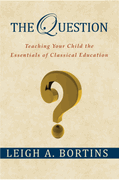It is at this point that Leigh Bortins is helpful. She very well knows the challenge facing thousands of homeschooling moms around the country who are educating their children classically. She knows how to start at the beginning (a very good place to start) and keep things simple, elegant and achievable. Now to use a word like “simple” to describe a book about classical education (which can be complicated and which many complicate) may sound like a criticism, but it is not. To take something big, various and complex and reduce it to its essential attributes is no easy task–it takes intelligence and self-control. I know this first-hand because I am one of those who is prone recklessly to dive into deep waters and then eagerly report what I don’t really yet understand. The recovery of the whole of classical education will take at least another generation–it is a long obedience, a a long labor of love. Bortins is wise: it turns out that homeschooling parents need a clear practical books first and foremost, and these are the kind of books she has set out to write. We need to walk before we run, and Bortins has set many to walking and walking fast. There will be time for other books and deeper learning, but the classical tradition should not be needlessly complicated–ever–but especially at the beginning.
So Bortins walks us into the tradition of dialectic, the art of asking wise questions that lead students to do the same. She crafts the book around the common topics of Aristotle: definition, comparison, relationship, circumstance and testimony) and shows how these topics or “lines of argument” can enable students to ask thoughtful questions of any art, study or discipline, essentially equipping students to engage truth, goodness and beauty wherever they are found. These common topics come from Aristotle’s Rhetoric, but they are well-suited to introduce us to dialectic. The fact that Bortins would use key content from rhetoric as key components of dialectic underscores two points: 1) Rhetoric did not (and need not) always follow dialectic. Rhetoric (aspects of it) can be taught earlier though its most prevalent place was after dialectic 2) Dialectic and Rhetoric are integrated and not completely discrete disciplines. Yes, we can use rhetorical elements (the common topics of invention) to engage in dialectic teaching. Yes, we will use logic as we engage in the teaching of rhetoric. The liberal arts can be used with great versatility–even to teach each other.









